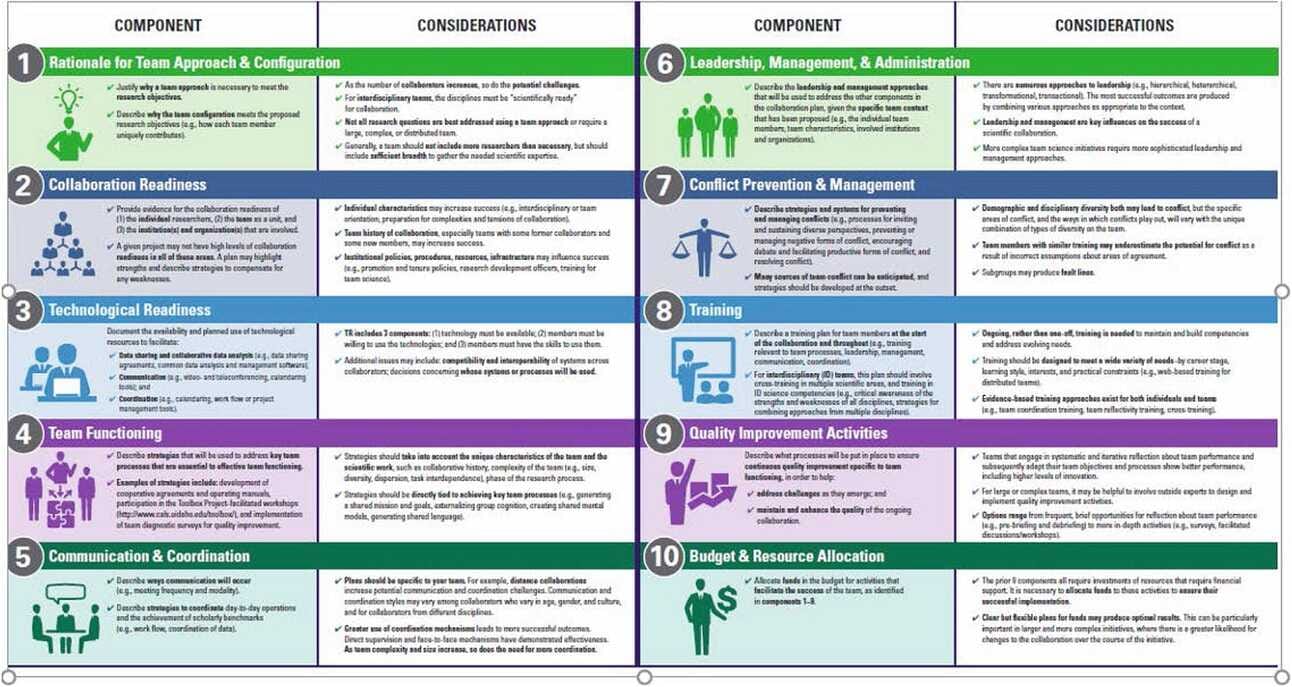Project Management
The Three Dominoes - Mike Petrovich
These are pretty good general purpose project team and management principles that apply particularly well in research computing:
Limit work-in-progress - too many things in flight makes it harder to track progress, to review each other’s work, and keeps people context-switching too often.
Minimize specialization - also makes it hard to review each other’s work, slows people down as there are more hand-offs, and decreases bus-number of specialized components.
Never sacrifice quality - goes without saying, although what quality means will depend on the team. Scope and timeline are generally negotiable; quality shouldn’t be.
Managing Teams
Collaboration and Team Science: A Field Guide - L. Michelle Bennett, Howard Gadlin, Christophe Marchand, NIH National Cancer InstituteComprehensive Collaboration Plans: Practical Considerations Spanning Across Individual Collaborators to Institutional Supports - Kara L. Hall, Amanda L. Vogel, Kevin Crowston, Strategies for Team Science SuccessOperationalization, implementation, and evaluation of Collaboration Planning: A pilot interventional study of nascent translational teams - Betsy Rolland et al., Journal of Clinical and Translational Science
These are aimed at researchers and collaborations, but teams working together is hard in any area. Setting clear goals about how teams will work together matters, and can determine the success of the collaboration.
And that means that the same approaches in other remote teams - being explicit and intentional about expectations, giving feedback, making sure you’re getting input from everyone, planning, and communicating those plans. In the NIH NCI field guide, Bennet, Gadlin, and Marchand have sections on topics that come up routinely in this newsletter in the single-team context:
Setting expectations
Psychological safety and encouraging (respectful, constructive) disagreement
Positive and negative feedback
Building consensus around a common vision
Handling conflict and strengthening team dynamics
The field book is a pretty comprehensive ebook with case studies about things working well and not in each area.
In “Comprehensive Collaboration Plans”, Hall, Vogel, and Crowston suggest (with citations) what areas should be covered in an explicit collaboration plan, as outlined below.

Finally, in “Operationalization, implementation, and evaluation of Collaboration Planning”, Rolland et al. offer advice from having thirteen new interdisciplinary collaborations go through facilitated sessions for doing such planning. They found that different teams needed different parts of the planning more than others, and that topics that the teams needed additional guidance were around information and data management, and more specific guidance around authorship policies and conflict management, but were broadly pleased with the results.
Obviously not every collaboration requires explicit, ten-section collaboration plan documents. But having given some thought to each of these areas, making sure there’s agreement about the items that are relevant to your collaboration early on, and keeping lines of communication open for the duration can help collaborations just as they help with individual teams.
Random
Finally, a URL Lengthener. Tired of easily and painlessly tying “ https://www.managerphd.com ” all the time? Great news, now you can tediously and excruciatingly direct your browser to https://aaa.aaaaaaaaaaaaaaaaaaaaaaaaaaaaaaaaaaaaaaaaaaaaaaaaaaaaaaaa.com/a?áaaÂáaaÂáaaÂáaaÂáaaÂáaaÂáaaÂáaaÂáaaÂáaaÂáaaÂáaaÂáaaÂáaaÂáaaÂáaaÂáaaÂáaaÂáaaÂáaaÂáaaÂáaaÂáaaÂáaaÂáaaÂáaaÂáaaÂáaaÂáaaÂáaaÂáaaÂåAæãæãæaæââÁáÆáÆææææææáÅæáåäæâåäåàæáåâåAåâåÆåÄæaæäæãåÀåÅåææãåäåàåÄæâáÅåÆæáåæ
The case for wireframing web pages and apps in Google Sheets.